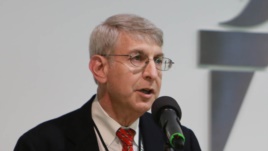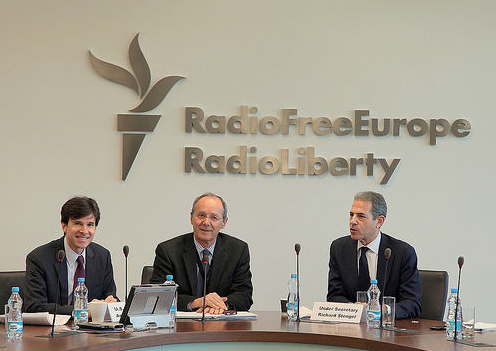BBG Watch Commentary

Radio Free Europe / Radio Liberty (RFE/RL) employees are telling BBG Watch of improvements in employee morale and program quality under new RFE/RL president Tom Kent. A longtime Associated Press journalist, Tom Kent was appointed the new President of Radio Free Europe/Radio Liberty (RFE/RL) on June 27, 2016.
One RFE/RL journalist, who prefers to remain anonymous, wrote:
RFE/RL JOURNALIST: “I haven’t spoken to him directly but I attended his speech in Prague, and I must say I was impressed. He sounds very smart, eloquent, and no-nonsense. He’s also a veteran journalist, which I think is very good news for [journalists] at RFE/RL. It may seem hard to believe from the outside, but [journalists] here are at the bottom of the food chain and have virtually no say in anything. It’s become a very top-heavy company. I hope Tom Kent can change this. He also firmly believes that journalism should be objective and bias-free, so hopefully he can address RFE/RL’s increasing shortcomings in this respect, too. Let’s see if he is strong enough to push through real change for those who actually produce content here.”
Another RFE/RL journalist wrote:
RFE/RL JOURNALIST: “This is RFE at its best. SO, it can be done, after all. No quirky videos, no dancing bears or goats playing soccer, no cartoons, just the best:”
###
RFE/RL
Q&A: Islamic State Has ‘Metastasized,’ Says Pulitzer Prize-Winner Joby Warrick
By Eugen Tomiuc
July 10, 2016
Territorial gains made by the Islamic State (IS) militant group in Iraq and Syria have come as a surprise for many observers, as has its ability to attract Muslim youths to its brand of radical Islam or drive them to perpetrate terrorist acts in its name. But some argue that, far from appearing out of nowhere, the radical group in its current form is the result of a transformation rooted in the Sunni insurgency that followed the U.S. invasion of Iraq in 2003.
One of them is Joby Warrick, whose book, Black Flags — The Rise Of ISIS, has won the Pulitzer Prize, America’s top journalism award. He talked to RFE/RL about IS’s origins and their ramifications.
RFE/RL: You describe in your book how Islamic State had different incarnations before becoming what it is now. Ultraviolent from the outset in 2004, when the Al-Qaeda in Iraq group led by Abu Musab al-Zarqawi aimed to trigger a sectarian conflict between Iraq’s minority Sunni and majority Shi’a groups — then incurring successive deadly blows which, by 2010, had turned it into a fringe structure called the Islamic State of Iraq. Then it resurfaced, deadlier than ever, once the Syrian civil conflict started. How was that possible?
Joby Warrick: It was a long time coming and people even now sometimes lose sight of the roots of this organization (Islamic State). This is something that didn’t just happen in 2014 when we all kind of focused on the Islamic State, but the seeds were planted more than a decade earlier with mistakes that were made when the U.S. went into Iraq unprepared for how to manage a country and unprepared to deal with ethnic conflicts, and really opening a door for some really bad characters to come in and start something that we’ve now come to know as ISIS.
READ MORE
The same RFE/RL journalist wrote previously:
RFE/RL JOURNALIST: “I said in a previous email that the hard-earned dollars so generously offered by the American people to U.S. international broadcasters to help inform people in unfree societies should not go to waste on small-time, narcissistic pseudo-stories about sausages or football-playing goats in countries either run or threatened by dictators.
The new RFE/RL President, Thomas Kent, told staff in his first appearance before them in Prague today (yes, he is the first newly-appointed president to make it to Prague so fast, which is a good sign), that as a child, he used to send a couple of dollars to RFE/RL during the Cold War, to help the radios. It wasn’t much, he told the audience, but for a young kid to spare a little from his allowance to help other kids and their parents hear the truth beyond the Iron Curtain it meant the world. Thomas Kent should now make sure that his investment back then, which bore a handsome return in 1989, does not go to waste due to incompetence, hubris, and lack of concern by the RFE/RL’s entrenched bureaucracy for those people still beyond the freedom’s reach. It’s a tall order, Mr. President, but the expectations are high.”
Radio Liberty’s Moscow Bureau was opened 25 years ago, on July 13. RFE/RL is planning a reception, which we were told Tom Kent, BBG Chairman Jeff Shell, BBG CEO John Lansing, and International Broadcasting Bureau (IBB) deputy director Jeff Trimble were planning to attend.
The RFE/RL Moscow Bureau’s history is quite complex. Some of its journalists changed sides and became leading figures in the Kremlin propaganda machine.
Many RFE/RL journalist still remember the mass firing of dozens of Moscow Bureau reporters and staffers by RFE/RL’s former American management in 2012 — a decision later partially reversed by the Broadcasting Board of Governors (BBG) and new management under former RFE/RL president Kevin Klose. Emotions still run high. We were told that some of the Russian journalists who had been fired in 2012 and decided not to return to RFE/RL or were not invited to return are not planning to attend the reception.
There is, however, cautious optimism among some RFE/RL employees that following a long period of stagnation after Kevin Klose’s departure in March 2014, the organization may have found a good leader. Whether Tom Kent will be able to cope with the rapacious and dysfunctional BBG bureaucracy in Washington still remains to be seen. Many believe that only the U.S. Congress can reform the agency, which in the words of former Secretary of State Hillary Clinton and former BBG board member, has become “practically defunct.”
